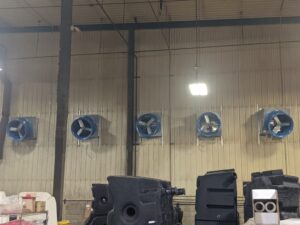Boosting Heat Management in High-Temperature Manufacturing: Why High-Velocity Intake Fans Are Critical
In high-temperature manufacturing environments—whether it’s metal forging, plastic molding, industrial baking, or heat treating—efficient heat management isn’t just about comfort; it’s about productivity, safety, and equipment longevity. While many facilities invest heavily in exhaust systems to remove hot air, a crucial component is often overlooked: pairing those exhaust fans with properly designed high-velocity intake fans.
The Heat Dilemma in Manufacturing
Processes like forging and molding generate extreme localized heat. Without adequate airflow, this heat builds up in work zones, creating hot spots that stress equipment, degrade product quality, and pose health risks to employees. In response, many facilities install powerful exhaust systems to pull hot air out. However, if those systems lack sufficient intake support, they quickly hit a limit in their effectiveness.
Why Exhaust Alone Isn’t Enough
Exhaust fans operate on the principle of displacement: for hot air to leave a space, cooler air must enter. When high-temperature facilities rely solely on exhaust, they often create negative pressure zones, which not only reduce the efficiency of the exhaust system but can also lead to air being drawn in from unintended areas—like dusty loading docks or contaminated process zones.
The result? Poor airflow balance, unpredictable air quality, and insufficient cooling—despite having high-powered exhaust.
The Role of High-Velocity Intake Fans
High-velocity intake fans solve this problem by forcefully introducing cooler, filtered air into the facility at controlled rates and angles. Here’s how they make a difference:
- Restoring Air Balance: Intake fans ensure that air enters the facility in a measured, directional manner, counterbalancing the draw of the exhaust system and stabilizing internal pressure.
- Enhancing Exhaust Efficiency: With fresh air continuously feeding into the space, exhaust fans can operate at peak performance, effectively removing heated air rather than struggling against negative pressure.
- Improving Thermal Stratification: In tall manufacturing environments, hot air tends to rise and stagnate. High-velocity intake fans promote mixing and circulation, preventing layers of hot air from forming near the ceiling and radiating back down.
- Protecting Equipment and Processes: Better airflow means better cooling of sensitive electronics, molds, ovens, or furnaces, reducing downtime caused by heat-related malfunctions or maintenance.
- Safeguarding Workers: Cooler work environments reduce the risk of heat stress and fatigue, helping to maintain productivity and morale, especially during summer months.
Industry Applications
- Metal Forging: Intake fans help push cooler air over hot dies and open forges, minimizing radiant heat exposure and helping to vent off heated fumes faster.
- Plastic Molding: They stabilize temperature around injection molding machines, ensuring material consistency and minimizing warping or defects.
- Industrial Baking: Intake systems bring in filtered outside air that aids in both temperature and humidity control, vital for baking consistency.
- Heat Treating: Introducing ambient air helps temper zones near furnaces and prevents heat from bleeding into control rooms or adjacent spaces.
Key Considerations for Implementation
When adding high-velocity intake fans to your facility, consider the following:
- Fan Placement: Fans should be located to draw in cooler, clean air—ideally away from pollutant sources or high-traffic zones.
- Filtration: Ensure intake air is filtered to prevent introducing particulates that could contaminate products or machinery.
- Airflow Matching: Intake airflow rates should complement, not exceed, exhaust rates to maintain optimal pressure balance.
- Seasonal Adjustability: Adjustable fans or automated louvers can help adapt to seasonal temperature swings.
Final Thoughts
Pairing high-velocity intake fans with your existing exhaust system isn’t just a best practice—it’s essential for optimizing airflow, protecting your workforce, and maintaining process integrity in high-heat environments. As manufacturers face rising energy costs and increasing demands for safety and efficiency, investing in a balanced ventilation strategy delivers long-term operational gains.








